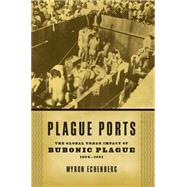Plague Ports
, by Echenberg, Myron- ISBN: 9780814722329 | 0814722326
- Cover: Hardcover
- Copyright: 1/8/2007
The 1800s were, from Jenner to Pasteur to Koch, the years in which more progress was made in controlling infectious disease than in the previous 10,000, yet at the end of that century Plague swept round the world and killed multitudes as if to admonish us for our arrogance. Most of us today, even students of medical history, have avoided paying heed to that admonishment. Myron Echenberg's excellent scholarship and scientific sophistication oblige us, as we cower under the threat of avian flu, to pay the Third Bubonic Plague pandemic the attention it deserves. -Alfred Crosby, University of Texas and author of Children of the Sun: A History of Humanity's Unappeasable Appetite for Energy A century ago, the third bubonic plague swept the globe, taking more than 15 million lives. Plague Ports tells the story of ten cities on five continents that were ravaged by the epidemic in its initial years: Hong Kong and Bombay, the Asian emporiums of the British Empire where the epidemic first surfaced; Sydney, Honolulu and San Francisco, three pearls of the Pacific; Buenos Aires and Rio de Janeiro in South America; Alexandria and Cape Town in Africa; and Oporto in Europe. Myron Echenberg examines plague's impact in each of these cities, on the politicians, the medical and public health authorities, and especially on the citizenry, many of whom were recent migrants crammed into grim living spaces. He looks at how different cultures sought to cope with the challenge of deadly epidemic disease, and explains the political, racial, and medical ineptitudes and ignorance that allowed the plague to flourish. The forces of globalization and industrialization, Echenberg argues, had so increased the transmission of microorganisms that infectious disease pandemics were likely, if not inevitable. This fascinating, expansive history, enlivened by harrowing photographs and maps of each city, sheds light on urbanism and modernity at the turn of the century, as well as on glaring public health inequalities. With the recent outbreaks of SARS and avian flu, and ongoing fears of bioterrorism, Plague Ports offers a necessary and timely historical lesson.







